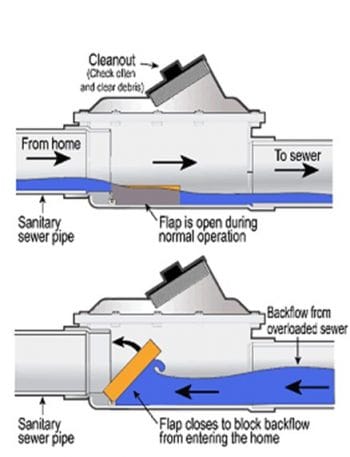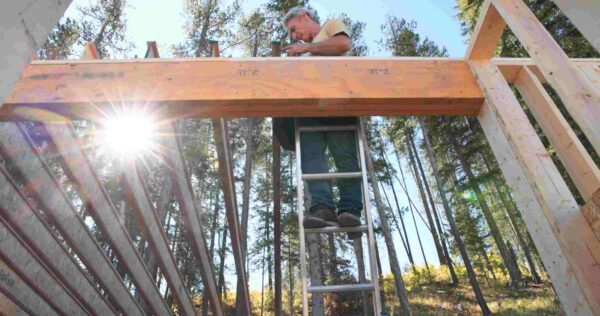
5 Tips To Prevent Your Basement From Flooding
Basement floods are quickly becoming one of the biggest issues for insurance companies and property owners alike. If you have ever experienced a basement flood or water damage you already know how stressful it can be. With the changing weather patterns and frequency of severe storms it is becoming more and more difficult to protect against. However, there are things you can do as a homeowner to help prevent your basement from flooding.
1. Clear Your Eavestroughs & Downspouts
This is without a doubt the easiest task to action. Clearing your gutters is important in the maintenance of your home and should be done in the early spring every year. If your downspouts are clogged or there is a blockage water can collect or pool and eventually enter your home home. Another important aspect of your downspouts is where they flow out to. You should make sure your downspouts are pointing away from your foundation and run at least 1-2 meters away from the foundation. If they are not properly positioned the water can pool and collect against the side of the house and eventually seep into the foundation.
2. Service Sewer Pipes or Septic Bed
Servicing your septic bed or sewer pipes is something a lot of us forget to do. Do you know the last time your sewer lines or septic bed was serviced? The results of a sewer backup or overflow can be devastating to your home. Scheduling a plumber to inspect your system is the best way to make sure your system is functioning properly and not at risk of backing up.
Another handy tool that many homes are now installing is a backwater valve. These valves are designed to close the sewer line in your home during periods of heavy rain to prevent water from entering into your basement. These can be expensive to install and do require a licensed plumber to do so but many insurance company’s will provide a discount on your home insurance policy if you have one installed. Some municipalities will also offer a subsidy to help offset the cost. Similarly to your sewer lines and septic bed your backwater valve needs to be cleaned out regularly to allow the flap to close properly and stop the flow of water back into your home.

3. Make Sure Your Sump Pump Is Working
Ensuring your sump pump is working properly is very important. When extreme rainfall occurs your sump pump will likely need to be working overtime. It is always important to monitor that it is working properly and pumping water from your basement out of your house. This means also checking the exterior discharge pipe, where the sump pump pushes the excess water out through. This should be far enough away from the foundation that the water isn’t flowing right back into the basement. It sounds simple but a lot of homeowners fail to place their discharge line far enough away and the water is continually flowing back into the home.
Heavy rainfall often brings with it thunder and lightning storms which can cause power outages. If the power goes out in your home your sump pump will not be able to operate. A battery backup or generator can often make a huge difference in these situations and most insurance companies provide a discount if you install one.
4. Check For Foundation Damage
One of the easiest ways for water to enter your basement is through cracks in your foundation. Cracks above the ground are easy to detect and should be repaired immediately when detected. However, it can be much more difficult to detect cracks below the surface. From your basement you can inspect the floors and walls. If you see a crack developing from inside you should seal it with epoxy. If the leaking persists you will need to hire a professional.
5. Properly Landscape Your Yard
The last tip is not an easy fix but it is worth it in the long run. Not only can you help make your house look beautiful but you will also be able to protect it from potential flooding. Grading your lawn and gardens so they slope away from the foundation well help to drain the water away from your home. Not to mention adding plants and shrubs around your house help absorb rain water and hold your soil together with their roots.
Bonus Tip: Know Your Insurance Coverage
The final tip is make sure you know what you are covered for on your property insurance policy. Water coverage is not included in a standard homeowner’s policy, you need to purchase the endorsement for water protection. Sewer backup coverage protects your home if the city sewer system or your septic bed cannot handle excess water causing it to flow back into your home. Overland water coverage provides protection for water that enters your home over the land. This is typically caused by extreme rainfall or nearby bodies of water overflowing and entering your foundation.
With the unpredictable weather it is important to be proactive when it comes to protecting your home. Doing the work before the heavy rains or weather begins changing can go a long way in avoiding headache down the road. If you have any questions about your insurance give your broker a call.
You Might Want to Read
November 8, 2023
Meet the Dougallers: Conor Hache
November 2, 2023
Welcome M.B. Kouri Insurance Brokers to the McDougall Insurance Team!
October 31, 2023
Why You Should Get Homeowners Builders Risk Insurance



